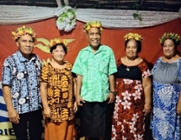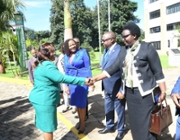.jpg)
Recent months have seen widespread discussion about the merits of the 2013 Commonwealth Heads of Government Meeting being held in Sri Lanka, most recently in the pages of the UK Financial Times newspaper and other media outlets.
I should start by declaring an interest many years ago I actively campaigned for improved working conditions for Tamil tea estate workers and in the 70s and 80s was a strong supporter of imposing firm economic and other sanctions on the then-South African apartheid regime.
Today many campaigners and Commonwealth civil society bodies are arguing that Sri Lanka is facing a human rights crisis, instigated by President Rajapaksa and his government. They feel that that by going to Colombo in November, Commonwealth leaders are endorsing this situation and there are certainly worrying developments in the country since the end of the decades long civil war in 2009: no provincial elections have yet been held in the Tamil North, the country’s Chief Justice has been impeached and there have been very serious incidents such as the murder of individual journalists investigating human rights abuses.
However Sri Lanka today is no apartheid South Africa. Its last national elections were democratic and since 2009, it has held free local government elections throughout the country, including in Jaffna and other Tamil areas, resulting in the elections of local Tamil mayors and councillors. Its Government has also produced a report on ‘lessons learnt and reconciliation’; although its critics claim it is ineffective. Perhaps most importantly, ordinary people can now live in peace, as seen by the bustling, family-friendly nature of Colombo’s beaches, previously patrolled by the military and cut off by barbed wire -at the time when the Tamil Tigers pioneered the suicide vest and assassinated the prime ministers of Sri Lanka.
Peace and reconciliation must of course be fully extended to all of the Tamil population and democratic opponents of the Government must not feel themselves threatened. One of the best ways to do this would be effective decentralisation of powers to the local communities. The Sri Lanka Government would be well advised to follow this road. Clearly, there are currently worrying human rights issues, but these are not untypical of a post-conflict situation after many years of strife and bloodshed: Although not exact parallels, other Commonwealth countries such as Uganda, Sierra Leone, Rwanda and even Northern Ireland, which continues to witness instability, hold important lessons for post-conflict peace-building.
Certainly Commonwealth leaders, when they go to Colombo, must remind their hosts of Sri Lanka’s commitment to upholding fundamental Commonwealth political values, not only this November, but at all times. In this context, it is highly doubtful if a boycott would achieve any results, other than entrenching anti-Commonwealth sentiment and furthering alliances with those countries less sensitive to observing democratic principles.
Even at the height of the apartheid regime in South Africa, there was a need to engage with progressive forces within the country, such as civil society and trade unions. In the case of Sri Lanka, there is also scope for supporting existing democratic structures and institutions within the country and to strengthen these and to work for an effective transition to a peaceful post conflict situation.
This is why the CLGF, working with the Commonwealth Secretariat and other partners is initiating a grass roots local government programme to assist in the healing of the deep wounds of civil war at the level where it matters most- that of the local communities. This programme – ‘Strengthening Local Governance for National Development’ will be launched in Colombo this July and is expected to last four years. Its aim is to help build democratic structures and improve local services within the context of the process of peace and reconciliation within the country: When I met with Tamil and other mayors from across Sri Lanka last year, their plea was for active engagement to support them –this is precisely what CLGF, working with India and its many other members in Asia and elsewhere, intends to do.





